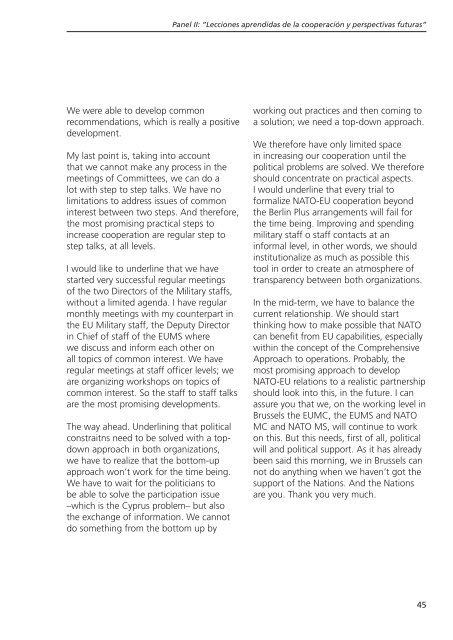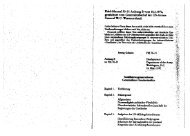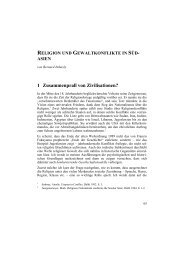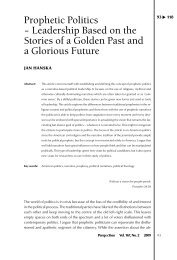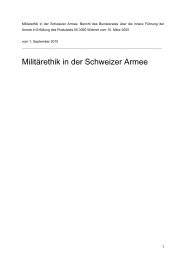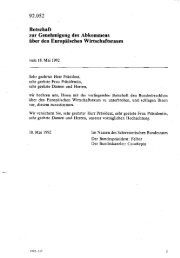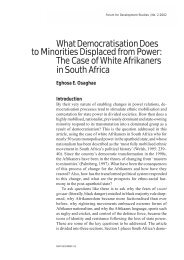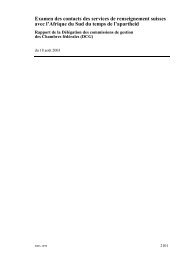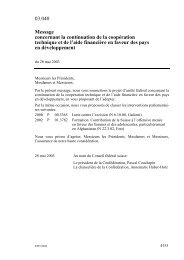El Futuro de la cooperación Unión European - OTAN
El Futuro de la cooperación Unión European - OTAN
El Futuro de la cooperación Unión European - OTAN
Create successful ePaper yourself
Turn your PDF publications into a flip-book with our unique Google optimized e-Paper software.
We were able to <strong>de</strong>velop common<br />
recommendations, which is really a positive<br />
<strong>de</strong>velopment.<br />
My <strong>la</strong>st point is, taking into account<br />
that we cannot make any process in the<br />
meetings of Committees, we can do a<br />
lot with step to step talks. We have no<br />
limitations to address issues of common<br />
interest between two steps. And therefore,<br />
the most promising practical steps to<br />
increase cooperation are regu<strong>la</strong>r step to<br />
step talks, at all levels.<br />
I would like to un<strong>de</strong>rline that we have<br />
started very successful regu<strong>la</strong>r meetings<br />
of the two Directors of the Military staffs,<br />
without a limited agenda. I have regu<strong>la</strong>r<br />
monthly meetings with my counterpart in<br />
the EU Military staff, the Deputy Director<br />
in Chief of staff of the EUMS where<br />
we discuss and inform each other on<br />
all topics of common interest. We have<br />
regu<strong>la</strong>r meetings at staff offi cer levels; we<br />
are organizing workshops on topics of<br />
common interest. So the staff to staff talks<br />
are the most promising <strong>de</strong>velopments.<br />
The way ahead. Un<strong>de</strong>rlining that political<br />
constraitns need to be solved with a topdown<br />
approach in both organizations,<br />
we have to realize that the bottom-up<br />
approach won’t work for the time being.<br />
We have to wait for the politicians to<br />
be able to solve the participation issue<br />
–which is the Cyprus problem– but also<br />
the exchange of information. We cannot<br />
do something from the bottom up by<br />
Panel II: “Lecciones aprendidas <strong>de</strong> <strong>la</strong> <strong>cooperación</strong> y perspectivas futuras”<br />
working out practices and then coming to<br />
a solution; we need a top-down approach.<br />
We therefore have only limited space<br />
in increasing our cooperation until the<br />
political problems are solved. We therefore<br />
should concentrate on practical aspects.<br />
I would un<strong>de</strong>rline that every trial to<br />
formalize NATO-EU cooperation beyond<br />
the Berlin Plus arrangements will fail for<br />
the time being. Improving and spending<br />
military staff o staff contacts at an<br />
informal level, in other words, we should<br />
institutionalize as much as possible this<br />
tool in or<strong>de</strong>r to create an atmosphere of<br />
transparency between both organizations.<br />
In the mid-term, we have to ba<strong>la</strong>nce the<br />
current re<strong>la</strong>tionship. We should start<br />
thinking how to make possible that NATO<br />
can benefi t from EU capabilities, especially<br />
within the concept of the Comprehensive<br />
Approach to operations. Probably, the<br />
most promising approach to <strong>de</strong>velop<br />
NATO-EU re<strong>la</strong>tions to a realistic partnership<br />
should look into this, in the future. I can<br />
assure you that we, on the working level in<br />
Brussels the EUMC, the EUMS and NATO<br />
MC and NATO MS, will continue to work<br />
on this. But this needs, fi rst of all, political<br />
will and political support. As it has already<br />
been said this morning, we in Brussels can<br />
not do anything when we haven’t got the<br />
support of the Nations. And the Nations<br />
are you. Thank you very much.<br />
45


